Quarantine Read online
Page 13
The abstractions can be put aside. Pressing my way through the streets, the idea that the crowd around me is collectively keeping the city from dissolving into a fog of simultaneous possibilities seems not so much unbelievable, as patently irrelevant. Whatever elaborate, and grotesquely counter-intuitive, underpinnings there might be to familiar reality, it stubbornly continues to be familiar. When Rutherford showed that atoms were mostly empty space, did the ground become any less solid? The truth itself changes nothing.
What I can't put aside is the fact that the Ensemble is doing Bubble science - and it makes no difference whether or not their hypothesis is correct. It's the idea that counts. The layers of security, the bodyguards for the volunteers, have nothing to do with any fear of commercial competition.
The Ensemble has precisely one enemy: the Children of the Abyss.
Boss wakes me smoothly in response to the knock on the door - leaving me clear-headed, but pissed off nonetheless; it's just after midday, and I've only had two hours' sleep. I give the HV an infrared command to display the image from the door's electronic peephole. My visitor is Dr Lui. I dress quickly, baffled. If I was needed back on duty for some reason, surely I would have had a call from Tong or Lee.
I invite him in. He surveys the room with a kind of apologetic bewilderment, as if to say that he'd never imagined that it could have been this humble, but now that he knows, I have his deepest sympathy. I offer him tea; he declines, effusively. We exchange some pleasantries, then there's an awkward silence. He smiles as if in agony, for a long half-minute, then finally says, 'My life is for the Ensemble, Nick.' It sounds half like a passionate affirmation, half like a self-loathing confession.
I nod, and then mumble, 'So is mine.' It's the truth, I
124
shouldn't be ashamed of it - but Lui's own signals are so intense, but confused, that I can't help being infected by his ambiguity.
He says, Ί know what you're going through. The inner battles, the paradoxes, the torment. I know.' I don't doubt him for a moment - and I feel a pang of guilt and unworthiness: his suffering at the cusp of the loyalty mod's contradictions has clearly been a great deal worse than my own.
'And I know you won't thank me for adding to your pain. But the truth never comes easily.'
I nod idiotically at this platitude, while a detached part of me wonders: is this the next stage? A kind of masochistic wallowing in the conflict that the loyalty mod creates? Forcing myself to dwell upon my reason's impotence -and romanticizing my distress into some kind of mystical, revelatory suffering? It makes a certain perverse sense: I don't want to resent the mod - so why shouldn't I try to view my mental turmoil in a different light, redefine its meaning, declare that it's leading me towards deeper insight and stronger faith?
Lui continues, 'We both want to serve the Ensemble -but what does that actually mean? Day by day we do our jobs, obey our instructions, play our part - hoping that those above us in the chain of command can be trusted to have the Ensemble's best interests at heart. But the question you must ask yourself is: do they deserve that trust? Are they serving the Ensemble with the kind of absolute dedication that to you or me would be second nature ... or are they merely serving their own interests? How can we be sure?'
I shake my head. 'They're part of the Ensemble. Our loyalty is to them -'
'Part of the Ensemble, yes. Our loyalty is to the whole.'
I don't know quite how to respond to that. It's certainly true - in the sense that the mod refers only to the Ensemble, and not to any specific person. But why bother making the distinction? What practical difference does it make?
125
I shift in my chair, self-consciously; Lui leans towards me, his earnest young face glowing with a kind of intellectual urgency. Our loyalty is to the whole. I'm beginning to wonder if he's constructed an entire system of moral philosophy around the effects of the loyalty mod - a prospect which makes me distinctly uneasy. It would hardly be the first time in history that a victim of mental illness has responded to their affliction that way - but it would certainly be the first time that I've found myself in the vulnerable position of sharing the brain-damaged prophet's impairment, down to the last neuron.
I say, reasonably, 'We all have to get orders from somewhere. We have to assume that the chain of command works. In practice, what alternative is there? I don't even know what the upper-level management structure of ASR is - let alone the Ensemble. And even if I did, what are you suggesting? That I should only take instructions from the very top? That would be absurd. Everything would grind to a halt.'
Lui shakes his head. 'I'm not saying that at all. Take your instructions from the top? There's more than one "top". Wei Pai-lingowns BDI, yes-' I frown and begin to disclaim any knowledge of the man, or the acronym, but Lui says impatiently, Ί know precisely how you joined us; there's no point wasting your breath. Wei owns BDI - but what makes you think he's in control of everything else? He has some limited influence over the other participants in NHK - but very little clout elsewhere. Did you think BDI found Laura Andrews?'
Ί suppose -'
Ά hacking group in Seoul "found" her - working through a mountain of stolen data on breaches of security in International Services institutions - for another client altogether. But they were aware of an offer the Ensemble had circulated - good money, for data fitting certain patterns - so they passed the information on.'
'Patterns? What patterns?'
Ί haven't been able to find that out yet.'
'Unexplained break-outs? I thought the Ensemble was
126
formed after BDI stumbled onto Laura . . . but you're saying the Ensemble already existed - and they were actively looking for someone like her?' 'Yes.'
'But how could they have suspected. . . ?'
Ί don't know- but that's beside the point. The question is: where should your allegiance lie? Globally, Wei's faction is in a minority. He had to bargain very hard to have BDI do the scanning of Laura Andrews - even though it was the closest appropriate facility. In the end, it was really only NHK's regulatory vacuum that tipped the balance in his favour; most other countries police the relevant technology too tightly. But if a certain piece of legislation hadn't been passed in Argentina, well. . . you and I might not even have been employed.'
I shake my head. 'So what? I never assumed that Wei was in charge. The Ensemble is an alliance of different factions - why should that worry me? If they can live with each other's differences, why can't I?'
'Because your loyalty is to the Ensemble - not to whichever faction happens to have manoeuvred itself into power. What if the alliance changes? What if it fragments, and re-forms with new goals, new priorities? Or, fragments and doesn't re-form? To whom would you owe your loyalty then? Which splinter group would you fight for, if it came to that?'
I start to say something dismissive, but I catch myself. The Ensemble is the most important thing in my life; I can't just shrug off questions like this, as if they weren't my concern. But-
I say, 'What can it actually mean, to be loyal to the Ensemble "as a whole" - if not to be loyal to the faction in power? It's a good enough principle for governments -' Lui snorts with derision. I say, Okay, I'm not suggesting that we should sink to the same level of cynicism. But what exactly are you suggesting? You still haven't stated the alternative.'
He nods. 'You're right, I haven't. First, I wanted you to concede that an alternative was necessary.'
127
I'm not sure that I've conceded any such thing, but I let it pass.
He says, 'There's only one group of people qualified to decide which of the factions - if any - truly represents the Ensemble. It's a question that has to be judged with the utmost care - and it can't possibly be a contingent matter of who is or isn't in control at any given moment. Surely you can see that?'
I nod, reluctantly. 'But. . . what "group of people"?'
'Those of us with loyalty mods, of course.'
I laugh.
'You and me? You're joking.'
'Not us alone. There are others.'
'But -'
'Who else can we trust? The loyalty mod is the only guarantee; anyone without it - wherever they are in the organization, even in the highest echelons - is at risk of confusing the true purpose of the Ensemble with their own private interests. For us, that's impossible. Literally, physically impossible. The task of discerning the interests of the Ensemble must fall to us.'
I stare at him. 'That's -'
What? Mutiny? Heresy? How can it be? If Lui does have the loyalty mod - and I can't believe that he's faked all this - then he's physically incapable of either. Whatever he does is, by definition, an act of loyalty to the Ensemble, because -
It hits me with a dizzying rush of clarity . . .
- the Ensemble is, by definition, precisely that to which the mod makes us loyal.
That sounds circular, incestuous, verging on a kind of solipsistic inanity . . . and so it should. After all, the loyalty mod is nothing but an arrangement of neurons in our skulls; it refers only to itself. If the Ensemble is the most important thing in my life, then the most important thing in my life, whatever that is, must be the Ensemble. I can't be 'mistaken', I can't 'get it wrong'.
This doesn't free me from the mod -1 know that I'm incapable of redefining 'the Ensemble' at will. And yet, there is something powerfully, undeniably liberating
128
about the insight. It's as if I've been bound hand and foot in chains that were wrapped around some huge, cumbersome object - and I've just succeeded in slipping the chains, not from my wrists and ankles, but at least from the unwieldy anchor.
Lui seems to have read my mind, or at least my expression, brother in insanity that he is. He nods soberly, and I realize that I'm beaming at him like an idiot, but I just can't stop.
'Infallibility,' he says, 'is our greatest consolation.'
By the time Lui departs, my head is spinning - and like it or not, I'm part of the conspiracy.
The brain-damaged arbiters of the nature of 'the true Ensemble' call themselves the Canon. All have the loyalty mod - but all have succeeded in convincing themselves that 'the true Ensemble' to which they owe allegiance is not the organization which goes under that name.
What, then, is 'the true Ensemble'?
Every member of the Canon has a different answer.
The one thing they agree on is what it isn't: the research alliance which calls itself the Ensemble is a counterfeit, a sham.
On my own, without Lui to keep propping up this bizarre way of thinking, I find myself wondering if I really have mastered the mental contortions required to sustain it. The Ensemble is not the true Ensemble - what kind of ridiculous, hair-splitting sophistry is that?
And yet. . . if I can somehow believe it, that's enough to make it true. Common sense, everyday logic, simply don't come into it: I have no rational reason to be loyal to the Ensemble - all I have is the anatomical fact of the loyalty mod. The true Ensemble that the mod refers to is whatever I'm physically capable of believing it to be -
That's ludicrous, it's nonsensical. . .
I pace the flat, trying to stay calm, hunting for a parallel, a metaphor - a model to guide me, however crudely, into some half-sane way of imagining what's
129
going on in my head. The Ensemble is not the true Ensemble. What is the true Ensemble, then? Whatever I honestly believe it to be.
This is insane. If every member of the Canon is free to interpret their allegiance precisely as they choose, as if it were a matter of private conscience, without regard to the existing authority . . . that's anarchy.
And then it finally hits me.
I understand how I can make sense of this, how I can explain it to myself.
I stop in mid-step and say out loud, 'Welcome to the Reformation.'
My induction into the ranks of the Canon is a gradual process; Lui arranges meetings in various locations around the city, with one or two members at a time - some from BDI, some from ASR, some from organizations unnamed. At first, I can't see what justification there could be for taking such risks; we discuss almost nothing that Lui hasn't already disclosed to me, and there'd certainly be far safer ways to introduce me to the Canon. Eventually, though, I realize that this personal contact is essential to the cementing of my new loyalties; only by talking face to face with these people can they convince me - and I them - that we really do share the mod.
Of course, the very fact that the members of the Canon should wish to meet, to cooperate, to confer at all, is paradoxical. Consensus should be anathema to us: the true Ensemble is defined within our individual skulls; no one else's opinion could possibly matter. Having freed ourselves from the lies of the sham Ensemble, why shouldn't we each follow our own unique, separately perfect, vision?
Because alone, divided, we'd have no hope whatsoever of reforming the sham Ensemble, of rebuilding it as it should be. United, the prospect is daunting - but not quite unimaginable.
My work goes on as if nothing had changed. The temptation to confide in Po-kwai, to explain everything
130
that I'm going through and everything that's been concealed from her, is almost overpowering at times - but not when I'm actually in her presence, with P3 granting me limitless self-control. Chen's instructions may no longer compel me to keep silent about Laura and BDI - but the need to protect the Canon now takes priority, and I find myself even more guarded with her than before. She seems puzzled by this at first, but then shrugs it off and withdraws into her reading. Our evening discussions of quantum metaphysics and invisible Bubble Makers come to an end. Primed, this makes no difference to me - but at home each morning, looking back on the featureless hours I've spent in the stake-out trance, I feel a strange, hollow ache in my chest, and it keeps me from choosing sleep.
The second phase of the experiment begins. Po-kwai returns to the ion room, her head full of radiolabeled glucose and neurotransmitter precursors, ringed by arrays of high-resolution gamma cameras. Very thoroughly observed - at least by the machinery. The data gathered by the gamma cameras, though, can be processed in a variety of ways, to reveal, or not to reveal, the operations of various parts of her brain - and the choice as to what will be shown to the experimenters (or rather, co-participants) on the control room screen will be made at random, at the last moment, by the computer.
'It's a bit like Aspect's delayed-choice photon experiments of the nineteen eighties,' she explains. 'Leung has worked out a kind of souped-up version of Bell's Inequality, a correlation between certain neurons firing or not firing, which ought to be below a threshold value -if all our assumptions are correct.'
The technicalities are over my head, but I get the gist of it easily enough: my hopeful alternative explanations for the role of the putative wave-collapsing pathways are about to be thoroughly demolished.
Meaning what? I'm going to have to swallow a universe where I'm the heir to an incomprehensible act of
131
genocide? I contemplate this prospect more and more frequently, but it still leads nowhere. I try feeding myself comforting parallels from evolution: I never felt guilty about the dinosaurs, did I? In fact, if Po-kwai is right, then the dinosaurs might not even have existed - in the sense that modern animals exist - until some mammal came along and made the past definite and unique, collapsing all the countless possibilities into a single evolutionary pathway. It all begins to sound reassuringly like one of those fatuous, entirely untestable, metaphysical conjectures: 'Maybe the universe was created this morning, complete with false memories for everyone, and perfectly faked archaeological, paleontological, geological and cosmological evidence for events spread over the last fifteen billion years . . .'
The only trouble is, the heart of Po-kwai's conjecture is testable. And the unpursuable idea spins on in my head, untouched, unanswered.
This time, the ion room is kept soundproof, and if Po-kwai mutters the results to herself as an ai
d to concentration, we're spared the ordeal of listening to her. Instead, the central console is the means by which Leung, Lui and Tse will collapse selected parts of her brain. I glance at the displays myself, now and then, but the PET scans, neural maps and histograms, colourful though they are, are too cluttered, and too cryptic to me, to capture my attention, and I have no trouble turning away.
I naively expected instant results, but there are flaws to be sorted out, in the equipment, in the software, in Po-kwai's now rusty command of the mod. No longer awash in the data, and unable to decipher the displays, I virtually lose interest while I'm on duty, even shutting out the chatter of the scientists. Primed, this is how it should be. Whatever ruling the Canon might eventually make on the worth of these experiments, my present role is perfectly clear: I'm to do the job that the sham Ensemble expects of me, as diligently as if my allegiances were unchanged.
Off duty, deprimed, I find myself wondering: maybe the Canon -just like the Bubble, just like the truths of
132
quantum ontology - makes no difference at all, in the end. Maybe, in practice, the real and the sham Ensembles will never diverge - and the distinction, crucial as it is to the members of the Canon, will remain an abstraction. Neither Lui nor anyone else has yet told me what the Canon would actually change, if it could control the sham Ensemble - and my own knowledge of the issues is still too hazy for me to have any firm opinions. I know I believe that Po-kwai ought to be told about Laura, and told how the mod was designed - but I stop short of doing so, realizing that I'm in no position to predict the consequences.
Maybe the Canon's only real function is to make our ineffectual heresy seem more tangible to us. Maybe we'll plot and conspire, to prove that we're free to plot and conspire - but in the end it will be nothing but a conspiracy of obedience.
As I step out of the bedroom, in the middle of the nightly ritual check of the apartment, Po-kwai says casually, 'We had a good set of data today. Virtually conclusive. Definitely publishable - if I can use that word under the circumstances. I didn't tell you in the restaurant. . . you see, I'm learning to keep my mouth shut.' 'Congratulations.'

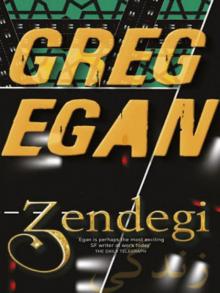 Zendegi
Zendegi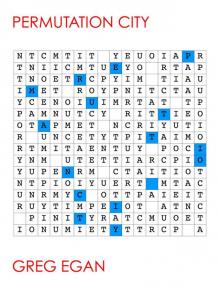 Permutation City
Permutation City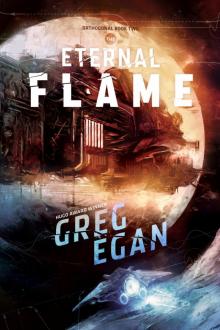 The Eternal Flame
The Eternal Flame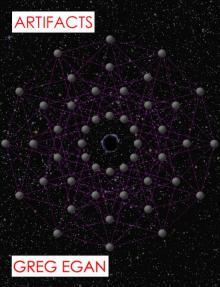 Artifacts
Artifacts Wang's Carpets
Wang's Carpets Dichronauts
Dichronauts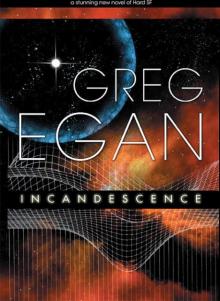 Incandescence
Incandescence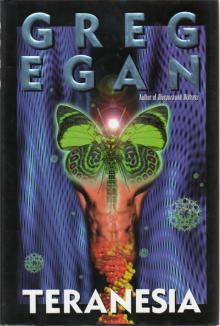 Teranesia
Teranesia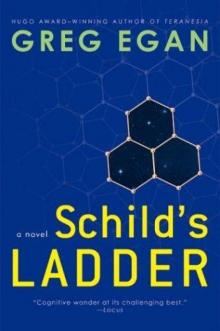 Schild's Ladder
Schild's Ladder Quarantine
Quarantine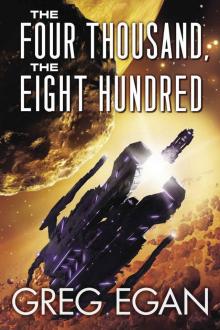 The Four Thousand, the Eight Hundred
The Four Thousand, the Eight Hundred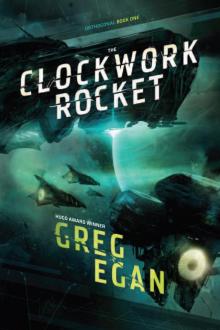 The Clockwork Rocket
The Clockwork Rocket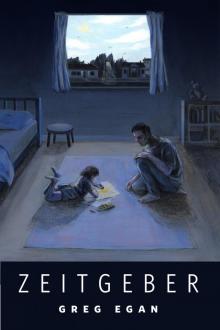 Zeitgeber
Zeitgeber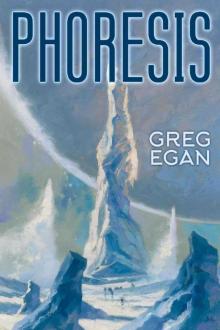 Phoresis
Phoresis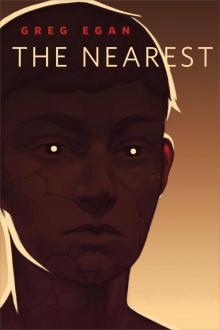 The Nearest
The Nearest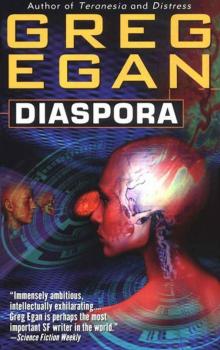 Diaspora
Diaspora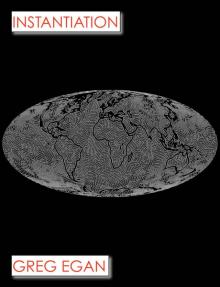 Instantiation
Instantiation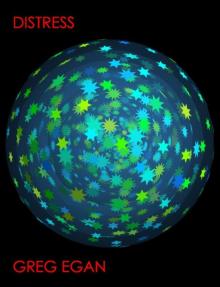 Distress
Distress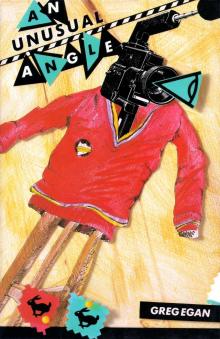 An Unusual Angle
An Unusual Angle Oceanic
Oceanic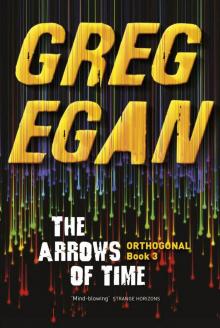 The Arrows of Time
The Arrows of Time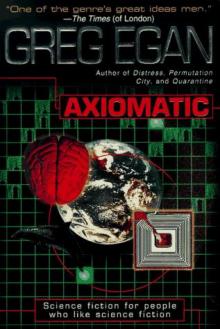 Axiomatic
Axiomatic![Anthology 2. Luminous [1998, 2010] Read online](http://i1.bookreadfree.com/i/03/18/anthology_2_luminous_1998_2010_preview.jpg) Anthology 2. Luminous [1998, 2010]
Anthology 2. Luminous [1998, 2010]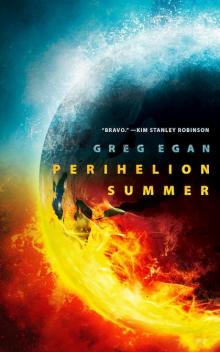 Perihelion Summer
Perihelion Summer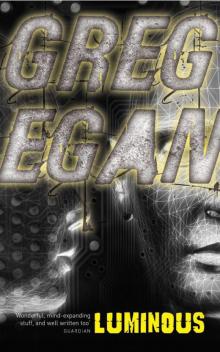 Luminous
Luminous